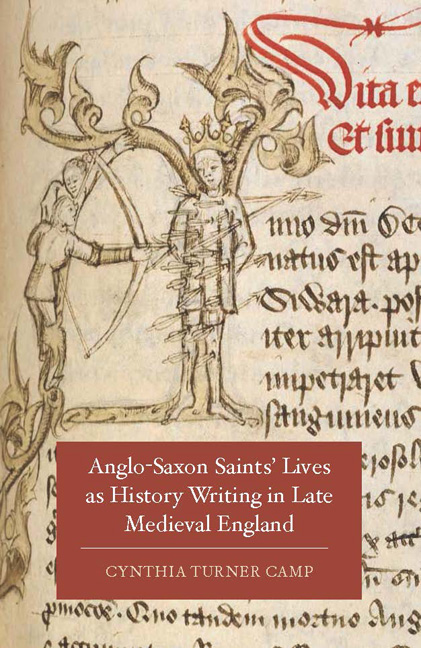Book contents
- Frontmatter
- Dedication
- Contents
- List of Illustrations
- Acknowledgments
- Abbreviations
- Introduction
- 1 Edith of Wilton and the Writing of Women's History
- 2 Audrey Abroad: Spiritual and Genealogical Filiation in the Middle English Lives of Etheldreda
- 3 Henry Bradshaw's Life of Werburge and the Limits of Holy Incorruption
- 4 The Limits of Narrative History in the Written and Pictorial Lives of Edward the Confessor
- 5 The Limits of Poetic History in Lydgate's Edmund and Fremund and the Harley 2278 Pictorial Cycle
- Bibliography
- Index
2 - Audrey Abroad: Spiritual and Genealogical Filiation in the Middle English Lives of Etheldreda
Published online by Cambridge University Press: 05 May 2015
- Frontmatter
- Dedication
- Contents
- List of Illustrations
- Acknowledgments
- Abbreviations
- Introduction
- 1 Edith of Wilton and the Writing of Women's History
- 2 Audrey Abroad: Spiritual and Genealogical Filiation in the Middle English Lives of Etheldreda
- 3 Henry Bradshaw's Life of Werburge and the Limits of Holy Incorruption
- 4 The Limits of Narrative History in the Written and Pictorial Lives of Edward the Confessor
- 5 The Limits of Poetic History in Lydgate's Edmund and Fremund and the Harley 2278 Pictorial Cycle
- Bibliography
- Index
Summary
The fifteenth-century poem ‘Why I Can't Be a Nun’ witnesses to a different conception of conventual life than does the Wilton Chronicle. The poem's speaker, Kateryne, is a pious girl who believes she has a vocation, but first her father and then, in a dream vision, Dame Experience convince her that a nunnery cannot offer the religious life she desires. Nunneries are populated by Dame Veyne Glory and Dame Dysobedyent, Kateryne's dream visit to a nunnery reveals, rather than Dame Charity and Dame Mekenes. The poem's satire on the ‘governawnce’ (line 311) of nunneries proposes not the institutional body's defining role, as in the Wilton Chronicle, but rather that the misgovernance of individual nuns' bodies taints the entire conventual project.
Yet this satire is reformist rather than vindictive, for Dame Experience acknowledges that ‘sum [nuns] bene devowte, holy, and towarde’ and that they ‘holden the ryght way to blysse’ (316–17). Similarly, Kateryne refuses to becomes a nun unless ‘suche defawtes that I have see’ would ‘amendyd be’ (331–32). Crucial to the poem's ethical revisionism are examples of devout women the contemporary nun should emulate. Literally central to this host of examples, at least in the poem's fragmentary state, is Audrey, seventh-century abbess and founder of Ely Abbey, twice-married royal daughter who nevertheless retained her virginity and was found incorrupt sixteen years after her death. Praised extravagantly by Bede and still lauded widely in the fifteenth century, Audrey was England's protovirgin and an enduring exemplar of female devotion, as in ‘Why I Can't Be a Nun’. That poem ends with two stanzas listing continental nuns like Clare of Assisi and English virgins like Frideswide and Edith; Audrey opens the second stanza's litany of abbesses and nuns: Eormenhild, Seaxburgh, Mildrith, and Wihtburgh. Ethical imitation, this poem suggests, allows one to enter into an extended community of holy women.
- Type
- Chapter
- Information
- Publisher: Boydell & BrewerPrint publication year: 2015



